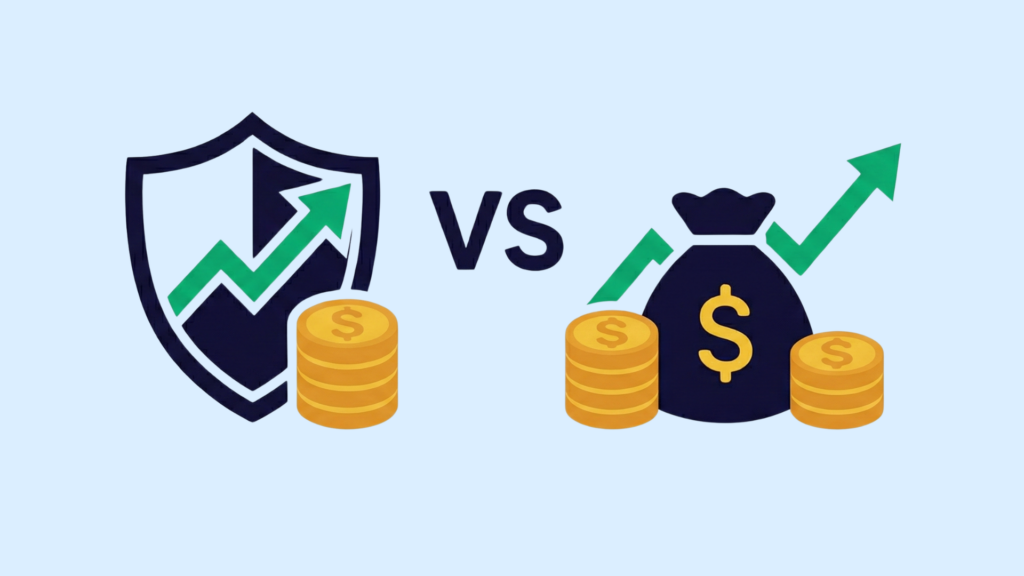Mutual funds offer a practical and accessible way to grow your wealth. Whether you are just starting out or looking to diversify your existing portfolio, mutual funds offer a flexible option to meet various financial goals.
They combine professional fund management with the convenience of low entry barriers, allowing investors to participate in markets without complex research or expertise. This blog will cover the major pros of investing in mutual funds and how they can fit into your financial strategy.
Key Benefits of Mutual Funds
Mutual funds are among the most popular investment options for people who want access to a professionally managed and diverse portfolio without needing deep knowledge of the markets. Some key benefits of these funds are:
Diversification to Reduce Risk
When you invest in a mutual fund, your money is spread across a range of assets like stocks, bonds, and money market instruments. This diversification reduces the impact of the poor performance of one asset on your overall investment. Instead of relying on the success of one company or one sector, you participate in the performance of many, which helps lower the overall risk.
Professional Fund Management
Mutual funds are managed by qualified fund managers who have expertise in researching, analysing, and selecting securities. They continuously assess market conditions and adjust the portfolio when needed. This professional management gives you access to strategies and insights that would otherwise require significant time, knowledge, and resources to build on your own.
Liquidity and Flexibility
Most mutual funds, especially open-ended schemes, offer high liquidity. You can redeem (withdraw) your money at any time, subject to applicable exit loads (charges applied if you withdraw early). This flexibility helps you access your funds during emergencies or when your financial goals change, without being tied down for a fixed term.
Tax Efficiency and Benefits
Equity-oriented mutual funds enjoy favourable tax treatment compared to other investment options. Long-term capital gains (on holding equity funds for more than one year) are taxed at a lower rate, and dividends received earlier were also tax-free for investors (now taxable as per your slab).
In addition, you can claim deductions under Section 80C by investing in specific mutual fund schemes like ELSS (Equity Linked Savings Scheme).
Transparency and Regulation
The Securities and Exchange Board of India (SEBI) regulates mutual funds in India. Fund houses must disclose their portfolio holdings, performance, and expenses regularly. This transparency lets you track your investments and understand exactly where your money is allocated, building trust and accountability.
Mutual Fund Investment Returns
When you invest in a mutual fund, your returns can come from three sources:
- Dividends and Interest: If the fund invests in dividend-paying stocks or interest-earning bonds, it passes on a share of this income to you. This income is distributed after deducting the fund’s expenses.
- Capital Gain Distributions: When the fund sells securities that have gained value, it earns a capital gain. These gains are usually distributed to investors at the end of the financial year, again after adjusting for any capital losses.
- Increase in Fund Share Price (NAV Growth): If the value of the securities held by the fund rises and the fund manager chooses not to sell them, the Net Asset Value (NAV) of the fund increases. You realise a profit when you sell your MF units at a higher NAV than what you bought them for.
Factors Influencing Mutual Fund Returns
Several factors can affect the returns you earn from a mutual fund, such as:
- Market Conditions: Fluctuations in equity, debt, or commodity markets directly impact the value of fund holdings.
- Fund Manager’s Strategy: The fund manager’s decisions on asset allocation, stock selection, and timing of investments significantly influence performance.
- Expense Ratio: This is the annual fee charged by the fund to manage your investment. A lower expense ratio can slightly improve your overall returns over time.
- Macroeconomic Factors: Inflation, interest rates, fiscal policies, and global events can impact the underlying securities held by the fund.
- Fund Category and Asset Mix: Equity, hybrid, and debt funds behave differently across different market cycles. The nature and diversification of the fund portfolio also play an important role.
Benefits of SIP Investment
Investing through a Systematic Investment Plan (SIP) is one of the most practical ways to build wealth steadily. It helps you invest a fixed amount regularly in a mutual fund, without worrying about market timing. Here are some benefits of SIP investments:
Power of Rupee Cost Averaging
When you invest through a SIP, you buy more units of a mutual fund when prices are low and fewer units when prices are high. Over time, this process averages out your cost per unit. This reduces the impact of short-term market volatility and helps you build your investment at a balanced average price. You do not need to predict the right time to invest, as your regular contributions smooth out the cost naturally.
Compounding Effect Over Time
Compounding means earning returns on your original investment and the returns earned in previous periods. In SIPs, every small investment you make starts earning its own returns, and those returns generate more returns over time. The longer you stay invested and the earlier you start, the stronger the compounding effect becomes, significantly boosting your overall wealth in the long run.
Disciplined and Hassle-Free Investing
SIPs create a habit of regular investing. Without manual intervention, you automatically invest a fixed amount on a fixed date. This consistency builds financial discipline, helping you achieve your goals like buying a house, funding education, or planning retirement. Since the amount is automatically debited from your bank account, you do not have to track the market actively or make investment decisions every month.
Best Lump Sum Mutual Fund Investment Strategy
You should consider putting a lump sum amount when you have a sizeable amount ready to invest and do not plan to break it into smaller installments. A lump sum strategy is suitable in the following cases:
- You Have a Long-Term Horizon: If you can stay invested for a minimum of 5 to 7 years, lump sum investments can help you capture the full growth potential of markets.
- Markets Are Fairly Valued or Corrected: If the market valuations (measured through metrics like the Price to Earnings ratio or P/E) are reasonable or after a market correction, lump sum investing may allow you to buy more units at lower prices.
- You Have a Clear Financial Goal: When you are investing with a specific objective in mind, such as retirement planning, buying a house, or funding your child’s education, a lump sum investment can align with your timeline and target corpus.
- You Are Comfortable With Short-Term Fluctuations: Lump sum investments can face higher short-term volatility. You should be able to stay invested without worrying about daily market movements.
Ideal Market Conditions for Lump Sum Investment
Apart from assessing your time horizon, choosing the right market conditions for lump sum investing can improve your investment outcomes:
- Post-Market Correction: Investing after a market correction offers the chance to enter at lower valuations, increasing the probability of better long-term returns.
- Stable or Growing Economy: A stable macroeconomic environment, improving corporate earnings, and favourable government policies can support steady market growth, making lump-sum investment more rewarding.
- Moderate to Low Interest Rates: Lower interest rates often push investors towards equity markets, boosting valuations. If the economic outlook is strong and interest rates are stable or declining, lump-sum investments can be a good time.
- Valuations Close to Long-Term Averages: When key valuation metrics like P/E and P/B (Price to Book) ratios are close to or below their long-term averages, it usually indicates a better entry point for lump sum investors.
Advantages of Mutual Fund Investment Over Other Options
Mutual funds offer a unique balance of growth potential, risk management, and ease of access. While traditional investment options like Fixed Deposits (FDs), Public Provident Fund (PPF), and direct equity have their place, mutual funds stand out for combining professional management with diversification.
Let’s see how mutual funds compare to these other options based on important factors.
Mutual Funds vs Fixed Deposits (FDs)
Fixed Deposits offer guaranteed returns but are often lower than inflation-adjusted returns over long periods. Mutual funds, especially equity and hybrid funds, have the potential to deliver higher inflation-beating returns over time, although they involve market risk.
Mutual Funds vs Public Provident Fund (PPF)
PPF has a 15-year lock-in period, which restricts access to funds except through limited partial withdrawals. Mutual funds offer investment options across short-term, medium-term, and long-term horizons with flexible entry and exit.
Mutual Funds vs Direct Equity
In direct equity investing, you must pick, monitor, and manage stocks, requiring time, expertise, and risk-taking ability. In mutual funds, professional fund managers handle stock selection, research, and risk management on your behalf.
Conclusion
Mutual funds offer a simple yet powerful way to build wealth through diversification, professional management, liquidity, and tax efficiency. Whether starting small through SIPs (Systematic Investment Plans) or investing a lump sum, mutual funds can suit various financial goals.
If you are a first-time investor, mutual funds provide an accessible and flexible route to start your investment journey with the support of expert fund management and transparent processes. Begin with a clear goal, stay consistent, and let compounding work in your favour over time.
FAQs
What are the main advantages of mutual fund investment?
Mutual funds offer diversification, professional management, liquidity, and flexible investment amounts. They give you access to various asset classes without needing expert knowledge. You can also start small and invest systematically toward your financial goals.
How do mutual fund investment returns compare with other financial instruments?
Compared to traditional options like Fixed Deposits or PPF, mutual funds have the potential to offer higher returns over the long term. While they carry market risks, the wide range of fund types—equity, debt, and hybrid—lets you choose based on your return expectations and risk appetite.
What is the difference between SIP and lump sum investment in mutual funds?
SIP means investing a fixed amount at regular intervals, helping you average out the cost over time. A lump sum investment means investing a large amount at one time. SIPs are better suited for managing market volatility, while a lump sum may be considered when you have surplus cash and favourable market conditions.
Are mutual funds suitable for beginners or first-time investors?
Yes, mutual funds are ideal for beginners. They offer access to diversified portfolios managed by experts. You don’t need deep market knowledge to get started. Plus, you can begin with a small amount and increase your investment gradually as you gain confidence.
How does diversification in mutual funds reduce investment risk?
Diversification means your money is spread across multiple stocks, bonds, or sectors instead of relying on one or two investments. In mutual funds, diversification helps balance losses in some assets with gains in others, reducing the impact of market volatility on your portfolio.
Disclaimer: Investments in securities markets are subject to market risks. Read all the related documents carefully before investing. The securities quoted are exemplary and are not recommended.























